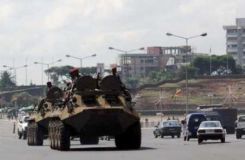Ethiopians collect dead after deadly post-election riots
ADDIS ABABA, Ethiopia, June 9, 2005 (AP) — Most stores were shuttered Thursday and families collected the dead for burial following riots over election results and government warnings that any more civil unrest would be dealt with sternly.

|
|
Ethiopian special forces patrol with armoured personnel carriers in Meskel Square in downtown Addis Ababa, Ethiopia, June 9, 2005. (Reuters). (AP). |
Ethiopian security forces opened fire on stone-throwing demonstrators in Addis Ababa on Wednesday, leaving at least 26 people dead, the government said. European Union observers said some opposition politicians were placed under house arrest following the government’s victory in last month’s election.
“The death toll now stands at 26, after a few injured people died during the night,” Information Minister Bereket Simone said Thursday, denying claims of a higher toll.
A senior member of the opposition United Ethiopian Democratic Forces was being held in his office by police and the top two leaders of the opposition Coalition for Unity and Democracy were under police surveillance, officials said Thursday.
Five office workers for the coalition were arrested, party members said, and the Ethiopian Human Rights Commission said two of their investigators were missing.
On Thursday, the European Union expressed “deep concern” about the violence.
Statements from E.U. foreign policy chief Javier Solana and development commissioner Louis Michel appealed “to all parties to avoid any incendiary language or action that could lead to further violence.”
Taxis and private bus drivers, as well as shop owners in the Ethiopian capital, began a strike Wednesday, after two days of protests that mainly involved students. The strike continued Thursday, despite government threats of retaliation.
Brahiru Zewdu, a prominent Ethiopian historian, said the riots were a shock.
“We had thought we were over this kind of violence, it was very unexpected,” he said. “After the last two months, when the country has been enjoying open discussions about the elections, this is clearly a set back for all of us and something we never wanted to see again.”
Ethiopia was an absolute monarchy until the mid-1970s, when a brutal Marxist junta known as the Dergue overthrow Emperor Haile Selassie. The 1980s were a deadly decade of civil war and famine. In 1991, what is now the ruling party overthrew the Dergue. In 1998, a border war broke out between Ethiopia and Eritrea, which had broke away from Ethiopia in 1991.
Ethiopia’s ruling party, which has pledged itself to democratic reform but shown authoritarian tendencies, claimed victory in May 15 elections based on provisional results. Opposition supporters say the vote and counting was flawed by fraud, intimidation and violence.
Families picked up the dead for burial Thursday.
Gashgish Manjeta, 45, wailed over the coffin of her 60-year-old father, Manjeta, a spice trader who died after being shot in the stomach.
“He was doing nothing wrong,” she said. “He was a businessman. He was not trying to loot shops or attack the police.”
The elections were seen as a test of Prime Minister Meles Zenawi’s commitment to reform his sometimes authoritarian regime. The protests have broken out despite a ban on demonstrations imposed immediately after the May 15 legislative election.
The U.S. government has touted Meles as a progressive African leader and a key partner in the war on terror; U.S. troops have even trained with Ethiopian troops that patrol the porous border with Somalia.
